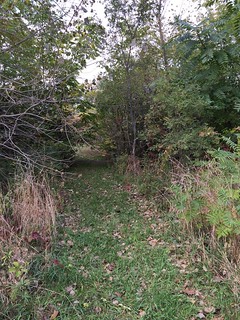Sound at the Pullman National Monument and State Historic Site: A Report

October 2015
By Erik Summerville
Borderbend Arts Collective, Pullman National Monument and State Historic Site, Outdoor Afro, and Midwest Society for Acoustic Ecology (MSAE) co-presented a multi-faceted community engagement sound event at Chicago’s Pullman National Monument and State Historic Site on Saturday, October 3rd. Eric Leonardson, founder and co-chair of the MSAE, kicked off the afternoon with a soundwalk which was followed an indoor spoken word performance by Chicago Phonography.
Audience members and artists alike enjoyed a unique opportunity to appreciate the sonic qualities of the environment to a much fuller extent than one might otherwise. Participants from a wide range of backgrounds attended, including those who knew of the event through artist friends, and those experiencing a soundwalk for the first time. Leonardson encouraged participants to not only listen to external sounds, but to also note the ways in which our presence contributed to this diverse soundscape: steps crunching leaves underfoot, breathing, heartbeats, and even the thoughts in one’s own head. During the course of the soundwalk, one began to sense how one’s own being contributes to any environment one is part of. Leonardson asked participants to consider the boundaries between personal and natural space, and to question conventional ideas regarding the presumed separation of humans from nature. In this way, the latter portion of the soundwalk served to remind participants of the repercussions of this constructed illusion of ”natural” hierarchical division and its influence on other systematized human constructs of discrimination, slavery, and centuries of racism.
As the soundwalk progressed, participants were encouraged to allow all senses to be amplified simultaneously, not just listening. The chirping of birds and the rustling of leaves merged with the smell of a nearby cookie factory and the exquisite colors. Interesting natural and manmade objects were found in the forested area at Pullman National Park. Participants were likely left motivated to continue to be more aware of the sounds and other sensory inputs that surround them daily, and to be more present in any given environment.
Following the soundwalk and post-soundwalk discussion, participants headed inside the Pullman factory for a performance by Chicago Phonography, who improvised sound by mixing recreated natural environments mingled with train sounds and various other sonic components. Artists Camille Anne Brewer, Toni Asante Lightfoot, and Yolanda Bradley-Crocker read from works about the Pullman porters and their contributions to American civil rights. Excerpts were taken from Larry Tye’s book Rising from the Rails: Pullman Porters and the Black Middle Class, as well as ”FDR, A. Phillip Randolph, and the Desegregation of the Defense Industries” and A. Phillip Randolph’s speech calling for jobs and freedom from the March on Washington. A. Phillip Randolph had organized the first African American led labor union, The Brotherhood of Sleeping Car Porters. Dan Godston, Executive Director of Borderbend Arts Collective, concluded the afternoon with thanks to all involved.
This sound event emphasized, at least to this participant, that just as an individual should strive to be aware of the sounds that contribute to the environment, one should make perhaps an even greater effort to be aware of the prejudices and inequities, including one’s own, that contribute to both visible and invisible landscapes of oppression and persecution that are always around us. The more consciously and thoroughly we address these insidious, ugly elements of our environment and ourselves, the more fully we will be able to embrace and contribute to the beauty that also surrounds us.
Erik Summerville is a student at DePaul University, in Media and Cinema Studies. He is also a filmmaker and is currently an intern at Border Bend Arts Collective.

